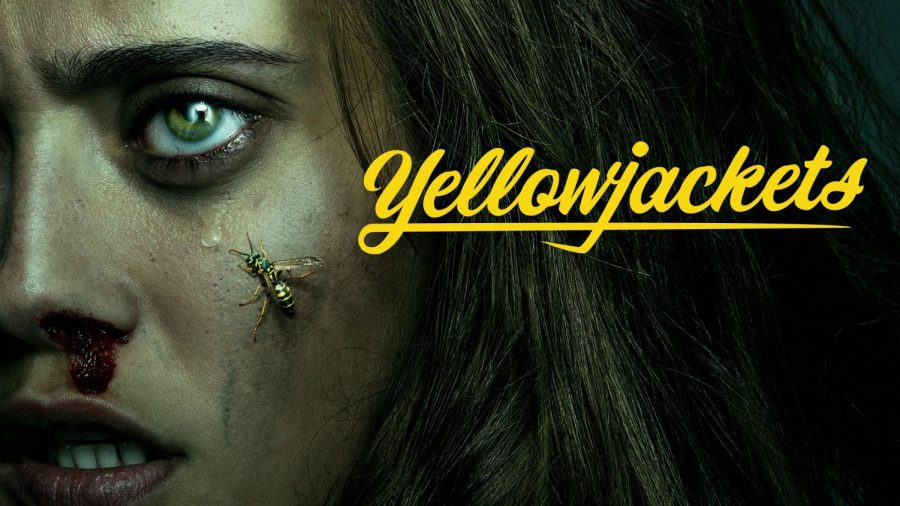How long until 1990?
Photo courtesy of Showtime Networks Inc.
Showtime’s new coming of age drama premiered Nov. 14, 2021
“Yellowjackets” Review: Showtime’s new retrospective on girlhood bares its teeth
Third wave feminism and the unsanitary female on screen
December 22, 2021
“Yellowjackets” is not about female bonding. It is not about supporting our fellow woman or overcoming the patriarchy in cute clothes. It is not consumerist feminism. It is black bleach pouring out of the mouth of a teen whose father is inches from touching her in the most sinister way. It is toxic romances and children that are bad simply because they were born that way. It is cynical, twisted and mean.
“Yellowjackets” is Showtime’s new coming of age horror-drama. It’s 1996, and you and your best girl friends are off to win the high school soccer championship. One of you is a punk, two of you are a secret couple, one’s on psychotropic drugs and one is sleeping with her best friend’s boyfriend, but you’re still a team. The plane you’re riding on to that trophy, however, has other ideas, and you suddenly crash land on a deserted island, with no one to find you and only one adult in sight.
“Yellowjackets” is about the relationships between girls that society finds unsanitary. It’s about brutality within the “gentler sex.” Suburbia keeps the unbridled rage and blood-thirst in check in the first part of the pilot episode, but bits and pieces of rotting flesh still manage to peak out. When the girls are flung into the wild, the cage that kept them together, that kept them clean and normal, is broken, and they are left without a gate to stop them from falling over the barriers.
Island survival shows aren’t usually like this. In “Lost,” the women are perfectly coiffed, and the majority of the cast consists of men. There are only two male characters in “Yellowjackets.” Travis and Coach Scott provide a nice contrast to the “hive” (their words, not mine) of young women whose fraught connections are slowly breaking down. And, like in any female-dominated survival story (such as “The Beguiled”), they are often at the center of the tensions, even the need for just one man’s patriarchal approval enough to break apart a tribe.
Two contrasting timelines, the present and 1996, allow for us to see the development of the central characters over 25 years: the effects of their traumas, both short and long-term. “Yellowjackets” is not simply a nostalgia fest, cemented in the ‘90s. It is a study of identity, the way early childhood bleeds into our psyche at 50 and how our 17 year-old self never truly vacates the shell of our body.
The most notable characters of the five female protagonists are Misty and Natalie, who are portrayed in the present day by Christina Ricci and Juliette Lewis, two of the most popular actresses from the ‘90s. Misty is the “weird girl” trope incarnate. Her hair is frizzy, and her huge glasses cover almost all of her pallid face. She quotes philosophers when defending herself. She knows how to cauterize the stump of a leg. Natalie is the group’s post-punk badass, her bleached Blondie-inspired hair set against a heavy black waterline. Ricci and Lewis’s interpersonal timing in their many scenes together is some of the best acting I’ve seen on television in a long time. The two actresses seem like they could be best friends in real life, although they may be mortal enemies on the screen.
The supernatural lurks behind the majority of the show. Sinister emotions are always mirrored by some metaphysical terror that may or may not exist. The paranormal, in “Yellowjackets,” mirrors the girls’ deepest desires, fears and ideologies. Taissa, another main character, is visited by ghosts which include a wolf and a man with no eyes. The mystery of the true meaning of these figments drives the ambiguity of the plot and heightens the tension of familial or political arguments.
The supernatural has always been used in cinema to magnify humanity’s dark core, to elevate the mundane, to turn jealousy from a rude smile to blood on the hands. In “Yellowjackets,” the supernatural allows the rites of adolescence, the things that are “normal” for a teen girl (chauvinism, bullying and familial strife), to become the monstrosities that everyone fears they truly are.
Female characters aren’t usually allowed to exhibit or express desperation without harsh judgement. Obsession and cruelty are taboo traits for women to possess, although, for men, they are, if not admired, at least normalized (look at any nerdy teen boy in an early 2000s film). “Yellowjackets” flings these traits to the forefront. The director allows the audience to form their own judgements about the actions of the characters, rather than moralizing, as is the temptation of any adult filmmaker when looking back at the reckless behavior of the teenagers they once knew and possibly were.
Like third wave feminism itself, the girls of “Yellowjackets” are not afraid to scream. The ‘90s was the time of Riot grrrl, Courtney Love and Bikini Kill and Elizabeth Wurtzel. It was a time when women weren’t trapped in false identities on a screen, where being ugly both internally and externally, though still obviously taboo, was reclaimed. Courtney Love’s smeared lipstick and sharpied stomach peered out at you from the tabloids. We now live in a watered-down culture; the female body is a perfect image to be scrolled through and dissected, not flesh, blood, bone and heart.
With more shows like “Yellowjackets,” perhaps we’re seeing a shift in culture. Maybe the smoothed-over filters of Instagram are giving way to something more internal. There’s a pulsing beat to the series, a beat that moves with grunge and terror and lust. Like the ‘90s itself, “Yellowjackets” may be a bit melodramatic at times, but it is never false. There is always some dark mark of realism within a premise that relies on a plane crash.

